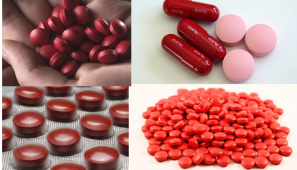
Iron tablets, taken by millions of people could damage the body within just 10 minutes, a study has warned.
This is the findings of a new study published in the peer-reviewed science journal PLOS One. Tests from the study showed the tablet rapidly causes DNA
damage in blood vessels.
Iron supplement tablets, taken by millions worldwide, are used to treat a range of conditions, such as blood loss caused by heavy periods or internal bleeding caused by stomach ulcers.
Lack of iron is known as iron deficiency anaemia. It is also very common for women to develop iron deficiency anaemia during pregnancy. The study investigated an important question: do iron supplements, which are taken by millions, harm our blood vessels?
The results did suggest iron can induce a DNA damage response at a genetic level in isolated human endothelial cells – those than line our blood vessels.
The study was carried out by researchers from Imperial College London and was funded by the Averil Macdonald Memorial Trust, the National Institute for Health Research, Imperial College Biomedical Research Centre; the British Heart Foundation and other donations from families and friends of hereditary hemorrhagic telangiectasia patients.
The researchers carried out the study in a laboratory setting, rather than living people and found the levels of iron given in supplements may be too high and harmful.
Iron supplements may contain 10 times more than is necessary for health, the researchers said. In future, doctors may want to think carefully about prescribing the minimum dose of iron necessary to patients who need it, researchers said.Iron is an essential element for life. Many women take the supplement after pregnancy and it is used as a treatment for anaemia, a condition caused by low levels of the mineral.
Dr Claire Shovlin, senior author of the study, at the National Heart and Lung Institute at Imperial College London, said that men need an average of 8.7mg of iron a day, and women who are menstruating need around 14.8mg a day.
A 100g of steak has 3 mg of iron, while the same weight of spinach contains 2.7 mg. It would be extremely difficult for a person to consume more than 20mg of iron from their diet, Dr. Shovlin said.
END

Be the first to comment